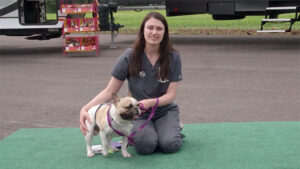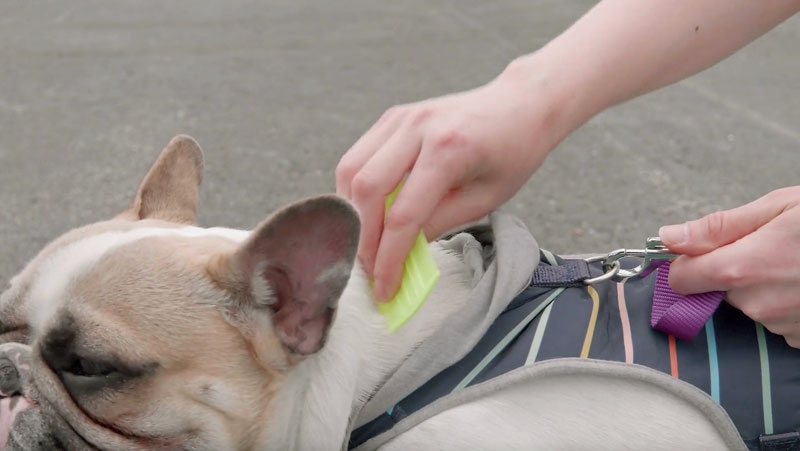rving with pets - paws on board
How to Manage Fleas on Your Pets While Traveling
Welcome to “RVing Today’s” “Paws On Board.” I’m Dr. Fitz, and this is Ace. Today we’re going to be discussing fleas. Yes, these are the dreaded little insects that can hitch a ride on our pets and make them scratch like you’ve never seen.
So what exactly are fleas? Fleas are small insects that are found in most outdoor environments. They find their way onto your dog or cat and hitch a ride for the remainder of their adult life. They survive by taking small blood meals, kind of like a mosquito, and then fleas will lay their eggs which fall off your pet and into the environment. This gets us to why fleas are such a problem. The flea eggs that fall into the environment, or in other words your house or RV, develop into a pupa which is similar to a cocoon. They will then do one of two things. They will stay dormant and wait until conditions are just right to emerge or they emerge right away as an adult flea. The entire life cycle can take as little as 2 weeks, and female fleas can lay several thousand eggs in their lifetime. This means that a small flea problem can quickly get out of hand and turn into an infestation within a matter of weeks.
 Fleas also pose a health problem to our pets. One of the most common issues that I see as a veterinarian is FAD or flea allergy dermatitis. This is a condition in which pets are hypersensitive to flea bites, and the bite of only one or two fleas can trigger a severe allergic reaction. These pets are intensely itchy and often develop severe skin infections. In addition to flea treatment, these pets will usually need antibiotics and steroids to feel better. Fleas can also be the source of systemic bacterial infections following a bite, some of which can spread to people. They can also be a source of tapeworms if your pet ingests a flea while they’re grooming.
Fleas also pose a health problem to our pets. One of the most common issues that I see as a veterinarian is FAD or flea allergy dermatitis. This is a condition in which pets are hypersensitive to flea bites, and the bite of only one or two fleas can trigger a severe allergic reaction. These pets are intensely itchy and often develop severe skin infections. In addition to flea treatment, these pets will usually need antibiotics and steroids to feel better. Fleas can also be the source of systemic bacterial infections following a bite, some of which can spread to people. They can also be a source of tapeworms if your pet ingests a flea while they’re grooming.
Needless to say all of these conditions, allergies, bacterial infections, tapeworms, and household infestations, can be avoided with one major component: prevention. Preventative products are key to preventing flea bites and infestations. There are many different formulations available, including flea collars, chewable products, and topical or spot-on treatments. Most products last for about 1 month, but there are several on the market that last longer. You should talk to your vet about which product would be right for your pet.
So we know that flea prevention can prevent infestations, but flea prevention is also used to treat infestations. Generally, products need to be used for a minimum 3 months in a row, if not longer, to fix a flea problem. Remember the pupa stage I talked about earlier? These can lay dormant for 4 months or more, biding their time until they have a host nearby. This means that if you store your RV for the winter you could have a resurgence of fleas once you take your first spring vacation. If you have your pet on an effective preventative product, you can essentially stop the flea lifecycle. This is exactly why most veterinarians recommend year-round flea prevention.
An important note about flea prevention is that it is specie specific. Do not apply dog flea products to cats as they can have life-threatening reactions to these medications. Finally, if your pet has fleas, cleaning your house or RV is a must. Fleas like to burrow deep into fabrics, meaning blankets, bedding, and rugs need to be washed well and carpets vacuumed frequently to get rid of the fleas.
 Here’s a quick check that you can do at home to check if your pet has fleas. You can grab a flea comb, which is a super fine-toothed comb like this, and comb through your pet’s fur. You comb around the base of the neck and the head and then around the tail base. You may catch some adult fleas, but you might also see a collection of black specks. If you see these, try to smear them on a paper towel with a small amount of water. If they leave a rust-colored trail on the paper towel, you’re seeing flea dirt or flea poop; meaning that yes, your pet has fleas. As I said before, preventing fleas is much easier than treating them, especially when on the road. So make sure your pet is up to date on their prevention before leaving for a trip and save yourself the headache of an itchy pet.
Here’s a quick check that you can do at home to check if your pet has fleas. You can grab a flea comb, which is a super fine-toothed comb like this, and comb through your pet’s fur. You comb around the base of the neck and the head and then around the tail base. You may catch some adult fleas, but you might also see a collection of black specks. If you see these, try to smear them on a paper towel with a small amount of water. If they leave a rust-colored trail on the paper towel, you’re seeing flea dirt or flea poop; meaning that yes, your pet has fleas. As I said before, preventing fleas is much easier than treating them, especially when on the road. So make sure your pet is up to date on their prevention before leaving for a trip and save yourself the headache of an itchy pet.
Tune in next time for more pet health information. I’m Dr. Fitz, and this is Ace. Thanks for watching “Paws On Board.”

